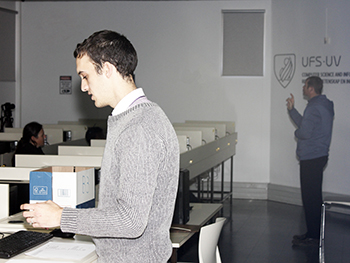The Monyetla Bursary Project, in partnership with the University of the Free State (UFS) and other sponsors, presents an annual Winter School for Grade 12s on the South Campus. In addition, a Saturday school for Grade 12s has been in operation since 2007.
“Champion teachers
in the district
assist learners”
Chris Grobler, a science teacher at Navalsig High School in Bloemfontein, is the organiser of both schools. He says, “I saw it as a tragic state of affairs that those offering bursaries and the bright learners from our formerly disadvantaged schools were not meeting up with each other.”
The first year saw 300 learners attending, with five subjects being presented. This tally has since grown to 650 learners each Saturday, with 11 subjects being presented, including Business Studies, Computer Applications Technology (CAT), Geography, Maths, and English.
“Our vision was to get champion teachers in the district to assist learners to qualify for university bursaries,” says Grobler. The project has succeeded in attracting educators with extensive experience as chief markers or even subject advisors in the Department of Education.

Roald Rautenbach presents the Computer Applications
Technology (CAT) class while Peet Jacobs interprets in SASL.
Video recordings are also made for later distribution.
Photo: Eugene Seegers
Wider reach
“This year, the 1 200 learners at the Winter School hail not only from the Free State but also from as far as North-West, Gauteng, and the Eastern Cape.” Grobler says, “We are very pleased about this, as it means that the image of the UFS is being carried further afield.”
Lesego Modisele, one of the visiting learners from Parys, says, “I like how they brought in teachers that are heads of their subjects, who are very experienced and help us a lot. They explain how exam papers are set and which important things to focus on.”
By means of the Schools Partnership Programme (SPP), 250 learners from Thaba Nchu and Botshabelo have also been assisted. Katleho Setloho, who was one of these students, is currently a medical student at the UFS.
A special feature included in this year’s programme is interpreting services in South African Sign Language (SASL) for Deaf students. As an added bonus, a disc of the sessions in SASL is being compiled for English, Mathematics, and CAT, with plans for it to be distributed to the deaf community in the rest of South Africa via the UFS.